
Symbolism was a late 19th-century art movement of French and Belgian origin in poetry and other arts seeking to represent absolute truths symbolically through language and metaphorical images, mainly as a reaction against naturalism and realism.

José Martiniano de Alencar was a Brazilian lawyer, politician, orator, novelist and dramatist. He is considered to be one of the most famous and influential Brazilian Romantic novelists of the 19th century, and a major exponent of the literary tradition known as "Indianism". Sometimes he signed his works with the pen name Erasmo. He was patron of the 23rd chair of the Brazilian Academy of Letters.
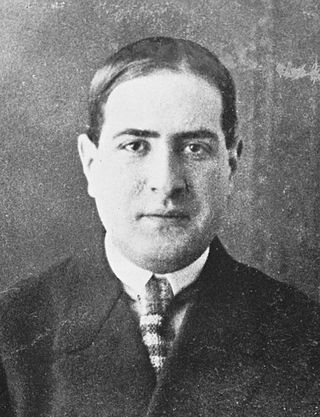
Mário de Sá-Carneiro was a Portuguese poet and writer. He is one of the best known authors of the "Geração D'Orpheu", and is usually considered their greatest poet, after Fernando Pessoa.

João Baptista da Silva Leitão de Almeida Garrett, 1st Viscount of Almeida Garrett was a Portuguese poet, orator, playwright, novelist, journalist, politician, and a peer of the realm. A major promoter of theater in Portugal he is considered the greatest figure of Portuguese Romanticism and a true revolutionary and humanist. He proposed the construction of the D. Maria II National Theatre and the creation of the Conservatory of Dramatic Art.

Alexandre Herculano de Carvalho e Araújo was a Portuguese novelist and historian.

Camilo Castelo Branco, 1st Viscount of Correia Botelho, was a prolific Portuguese writer of the 19th century, having produced over 260 books. His writing is considered original in that it combines the dramatic and sentimental spirit of Romanticism with a highly personal combination of sarcasm, bitterness and dark humour. He is also celebrated for his peculiar wit and anecdotal character, as well as for his turbulent life.

José Sobral de Almada Negreiros was a Portuguese artist. He was born in the colony of Portuguese São Tomé and Príncipe, the son of a Portuguese father, António Lobo de Almada Negreiros, and a Santomean mother, Elvira Freire Sobral. Besides literature and painting, Almada developed ballet choreographies, and worked on tapestry, engraving, murals, caricature, mosaic, azulejo and stained glass.
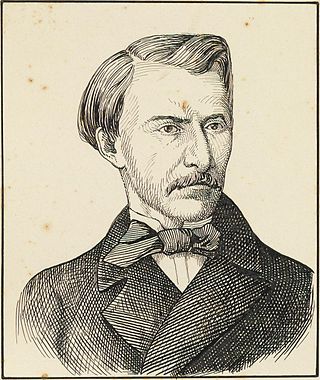
Domingos José Gonçalves de Magalhães, Viscount of Araguaia, was a Brazilian poet, playwright, physician and diplomat. He is considered the founder of Romanticism in Brazilian literature, and was a pioneer of Brazilian theatre.
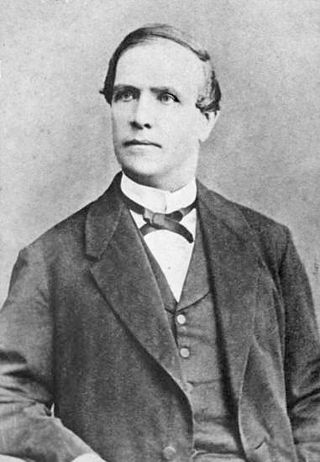
Francisco Adolfo de Varnhagen, Viscount of Porto Seguro, was a Brazilian diplomat and historian. He is the patron of the 39th chair of the Brazilian Academy of Letters. He is considered "the father of modern Brazilian historical scholarship."

José Duarte Ramalho Ortigão was a Portuguese writer of the late 19th century and early 20th century.
Romanticism arrived late and lasted only for a short but intense period, since in the second half of the 19th century it was supplanted by Realism, whose nature was antithetical to that of Romantic literature.
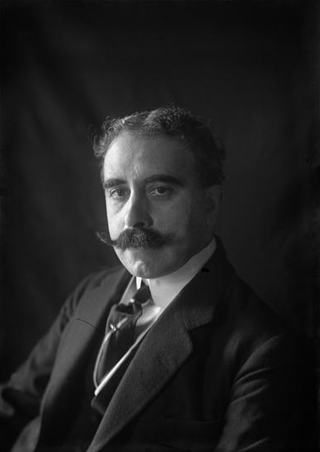
Júlio Dantas, GCC was a Portuguese doctor, poet, journalist, politician, diplomat and dramatist. He was born in Lagos and was a prolific writer; he cultivated various literary genres, from poetry to novels and journalism, becoming best known as a playwright. He died in Lisbon.
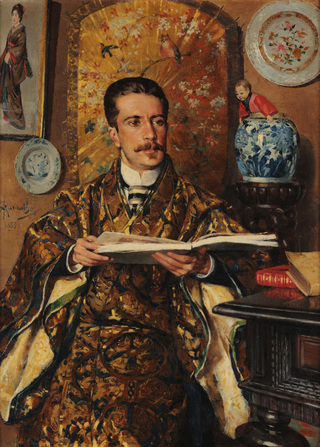
Abel Acácio de Almeida Botelho, was a Portuguese military officer and diplomat who distinguished himself as a writer. A representative of Naturalism in Portugal, he wrote, among others, O Barão de Lavos and O Livro de Alda, the first two titles in his "Patologia Social" series. In 1911, he took part in the commission that selected and approved the draft of what would become the current flag of Portugal.

António Botto was a Portuguese aesthete and lyricist poet.
José Gabriel Lopes da Silva, also known as Gabriel Mariano, was a Cape Verdean poet, novelist, and an essayist.
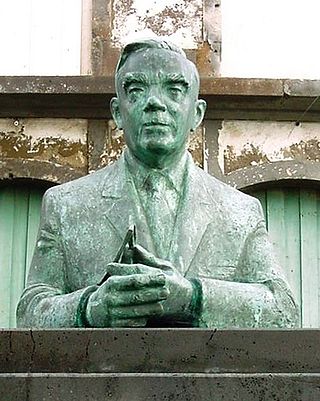
Vitorino NemésioMendes Pinheiro da Silva was a Portuguese poet, author and intellectual from Terceira, Azores, best known for his novel Mau Tempo No Canal , as well as being a professor in the Faculty of Letters at the University of Lisbon and member of the Academy of Sciences of Lisbon.

Antônio Peregrino Maciel Monteiro, 2nd Baron of Itamaracá was a Brazilian poet, orator, diplomat, politician, physician and journalist. He is the patron of the 27th chair of the Brazilian Academy of Letters, patron of the 7th chair of the Pernambucan Academy of Letters, and of the 23rd chair of the National Academy of Medicine.

Carlos Magalhães de Azeredo was a Brazilian poet, short story writer, diplomat and journalist. He founded and occupied the 9th chair of the Brazilian Academy of Letters, from 1897 until his death in 1963, thus being the academic that occupied his chair for the longest time and the youngest founder of the Academy.
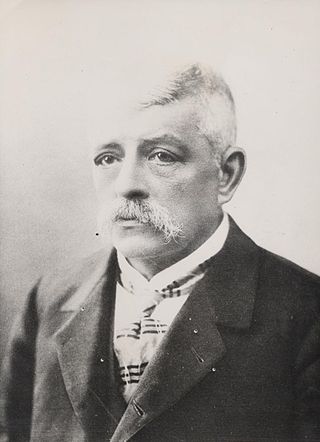
Tristão de Alencar Araripe Júnior was a Brazilian lawyer, literary critic, and writer.

Maria Fernanda Teles de Castro de Quadros FerroOSE was a Portuguese writer, poet, and translator. She was founder and director of the National Association of Children's Parks and of the magazine Bem Viver. She also wrote music for fado, marches and children's songs, as well as screenplays for film and ballet.



















